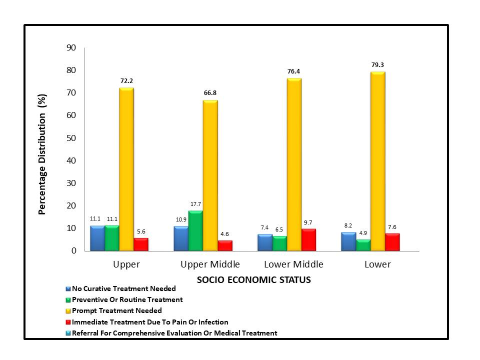-
Home
-
About JCTR
-
Gold Open Access
-
Issues
-
Editorial board
-
Author guidelines
-
Publication fees
-
Online first
-
Special issues
-
News
-
Publication ethics
-
Partners
-
Submit your manuscript
-
Submit your review report
-
Editorial Office
-

This work is licensed under a Creative Commons Attribution-NonCommercial 4.0 International License. ISSN print: 2382-6533 ISSN online: 2424-810X
Volume 7 Issue 4
Determination of the oral health status and behaviours, treatment needs and guardians’ perception of oral health among preschool children attending ICDS Anganwadi centres of Belgavi, South India: A cross-sectional study
Vaibhav Kumar*, Anil Ankola, Roopali Sankeshwari, Sagar Jalihal, Swarali Atre, Sreekanth Kumar Mallineni
Kumar et al. J Clin Transl Res 2021; 7(4):7
Published online: July 16, 2021
Abstract
Background and aim: Anganwadi Centres are the epicenters of health services for many Indian children. The study aims to assess the oral health status, treatment needs, and association with demographic variables, oral health behaviors, and parents’ perception among pre-schoolers in these Anganwadis.
Methods: A descriptive cross-sectional study was conducted among 1200, 3-5-year-old pre-schoolers from 48 Anganwadis in Belgavi. They were examined in accordance with WHO Oral Health Proforma (2013). A self-administered questionnaire assessed their parents’ perception of their oral health. SPSS software (version 20) was used for statistical analysis. Spearman’s correlation test correlated subscales and global health and oral health questions. Chi-square test computed categorical data. One-Way ANOVA test was used for multiple group comparisons. P-value < 0.05 was considered statistically significant.
Results: Prevalence of dental caries was found to be 76.1% and gingival bleeding was found in 30.4% participants. The most common oral mucosal lesions were ulcers (5.1%) followed by abscess in 4.5% of children. 67% of the parents perceived their child’s oral health as good. A staggering 98.5% of parents had not taken their children to the dentist ever. 76.8% of the children required prompt treatment.
Conclusion: Poor oral health status necessitates prompt action with age-specific targeted interventions for the curtailment of the prevalent oral maladies along with preventive strategies for the rejuvenation and resurrection of the plummeted oral health status for restoring the quality of life, coupled with motivation meted out to utilize the abundant dental services available in Belagavi.
Relavence to Patients: Preschool children attending the ICDS Anganwadi centres form a nested cohort of a triangulation of need, presentation and requirement for a targeted and focused intervention pertaining to oral health hygiene and other important constructs of overall general well being. This hypothetsis generating exploratory study opens up ways and channels for such oral health related translational activities to be planned, implemented and periodically evaluated, as part of the standar procedures and protocols of the machinery.

DOI: http://dx.doi.org/10.18053/jctres.07.202104.007
Author affilation
1. Department of Public Health Dentistry, Address: TPCT's Terna Dental College, Nerul, Navi Mumbai, Maharashtra
2. Suitradhaar Strategies Pvt. Ltd, India3. Department of Public Health Dentistry, KLE VK Institute of Dental Sciences, KLE Academy of Higher Education and Research, Belagavi, Karnataka4. Department of Preventive Dental Science, College of Dentistry, Majmaah University, AlMajmaah, Riyadh Province, Saudi Arabia
*Corresponding author
Vaibhav Kumar
Department of Public Health Dentistry, Address: TPCT's Terna Dental College, Nerul, Navi Mumbai-400706, Nerul, Navi Mumbai, Maharashtra, India.
Suitradhaar Strategies Pvt. Ltd., India.
Tel: +91-9742501587
Email: drvaibhav1989@gmail.com
Handling editor:
Michal Heger
Department of Pharmaceutics, Utrecht University, the Netherlands
Department of Pharmaceutics, Jiaxing University Medical College, Zhejiang, China

